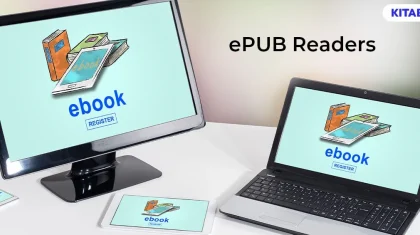
What Is the Difference between Audiobooks and Digital Books?
Audio and digital books are the modern tech-savvy cousins of old hard-bound prints. The debate of old vs. new will continue into the foreseeable future, but now, there is a new debate on the horizon: the one between these new-age mediums.
On the one hand, digital books are becoming increasingly popular, thanks to platforms like KITABOO that make it a breeze to create and publish interactive digital books. On the other hand, audiobooks are gaining popularity, too, as a more convenient way to read.
So, let us look at how these modern alternatives of consuming literature stack up against one another and help you decide the alternate reading medium that works best for you.
Table of Contents
1. Digital Books - An Overview
The emergence of eBooks on a commercial scale can be traced back to the 1970s when Michael S. Hart typed the Declaration of Independence into a computer and uploaded it to the internet. Fast forward a few years to 2007, when Amazon launched the Kindle, and the rest is history.
Today, digital books are an extremely popular alternative to traditional books and publishing them is easier than ever. You either do it yourself or hire a professional service such as KITABOO to do it for you.
So why have digital books become so popular? Let’s find out.
The Pros of Digital Books
Digital books are now the fastest-growing medium of consuming literature. This year, the number of eBook users globally is ~982 Million. The following advantages they offer are the primary reason.
No Limitations on the Type of Content: Digital books support images, videos, graphics, and illustrations, which are key elements for educational material or scientific journals. The interactive nature of digital books also plays a significant role in improving engagement levels and knowledge retention.
Highlighting and the Ability to Take Notes: Almost all eBook readers on the market today support the ability to highlight portions of text and jot down additional notes or comments as you read along. A feature that is a massive plus for any non-fiction piece of writing.
Small File Sizes: Digital books, no matter how graphic-heavy, have relativity small file sizes (usually a couple of MBs), which allow you to carry a library equivalent of books in the palm of your hand.
They Retain the ‘Sense or Feeling’ of Reading: While the most avid readers out there would still stand by the smell of a new book or the feeling of turning a crisp new page, eBooks still retain that sense of “reading,” which makes you feel a lot more connected to the content.
They Are Economical: Digital books are the most economical form of literature to publish. They do not involve the expenses incurred by printing a book nor the expenses associated with developing audiobooks.
2. Audiobooks - An Overview
As far as history goes, the very first forms of the spoken word predate eBooks. The phonograph, a device intended to help the blind read, was the brainchild of Thomas Edison and can be considered the birthplace of this technology. The year was 1877.
This vision, however, came to fruition in the 1930s when audiobooks (recorded on vinyl records) were made widely available to the public courtesy of The American Foundation for the Blind and the Library of Congress when they established the Talking Books Program.
As technology progressed, audiobooks existed in various forms, from cassettes in the 1950s and 60s to CDs in the 1970s and 80s. The rise of the internet and streaming services in the 1990s and 2000s led to the digital format we are all familiar with today.
The Pros of Audiobooks
Audiobooks have their advantages in certain situations, such as
They Appeal to Non-readers: Learners come in different forms. Some respond well to reading, while others do visually. Audiobooks open up a new avenue for gaining knowledge for the demographic that responds best to listening as a medium of learning.
You Can Listen to Them Anywhere: Reading a book, whether digital or physical, requires little peace and quiet. Audiobooks, on the other hand, are mostly consumed via ear or headphones, which can drown out all of the background noise. This makes them a better alternative for consuming information in noisy environments.
They Allow You to Be More Productive: The most significant advantage of an audiobook is listening to one while performing other mundane tasks based on muscle memory. You can continue listening to audiobooks while you cook, clean, shower, and even drive to work.
3. How Do You Choose Between Them?
Audio and digital books are both excellent alternate mediums in their own right. However, each shine in specific scenarios and has its distinct drawbacks.
How are Digital Books Better than Audio Books?
Here are a few reasons why digital books may be the better choice for you:
The Cost: For the most part, the audiobook version is more expensive than its digital book counterpart. This comes down to the expenses incurred in hiring the studio space, the voice actors, the editing involved, and so on.
Highlighting: Digital books are downright better when highlighting portions of text for easy reviewing later on. While audiobooks support this functionally to a certain extent, they are more challenging to use when compared to eBooks.
Smaller File Sizes: eBooks are a fraction of the size of an audiobook. On average, an audiobook is about roughly between 75 – 100 times the size of a digital book. If space is limited, digital books are the way to go.
Larger Collection of Titles: While the numbers are growing steadily for audiobooks, they are nowhere close to their digital siblings.
How are Audio Books the Better Choice?
Audiobooks are a great choice for people looking for a more convenient and flexible way to read. They come into their own for the following reasons:
Multitasking: Audiobooks are the answer if you have a busy schedule and cannot find dedicated time to sit down and read. You can listen to one while doing any of your mundane everyday household chores.
When Learning a New Language: If you are trying to pick up speaking in a new language, audiobooks can help. You learn the proper pronunciation of words, how to form sentences, and how to modulate your voice to convert emotions better.
Health Benefits: Reading for long periods can strain your eyes, cause headaches, and leave you with a sore neck, shoulders, or a strained back. Audiobooks do not add to the sedentary lifestyle, which has a proven track record of inviting health issues.
4. The Differences at a Glance
The following table highlights the key differences between these two formats:
| Digital Books | Audio Books | |
| Format | Text | Audio |
| Price | Cost Effective | Generally more expensive |
| File Sizes and Portability | Tiny File sizes | Considerably larger file sizes limit portability |
| Ability to highlight and take notes | Yes | No, or limited |
| Availability of Titles | Vast | Limited selection by growing steadily. |
5. Summing It Up
Audio and digital books are great alternatives to traditional reading material but have differences, individual advantages, and drawbacks. The choice between them comes down to your specific needs.
If affordability, smaller file sizes, and the ability to highlight text and take notes are a priority, digital books are for you. Audiobooks are a better choice for reading on the go.
Want to create and distribute amazing digital books? Try KITABOO today. We are a digital publishing platform that can help you transform your print books into interactive and accessible digital books.
Contact our expert team now and get started!
To know more, please write to us at contact@kitaboo.com.
Suggested Reads:
- Best eBook Creation Software
- Advantages of eBooks Over Printed Books
- How eBook Reader Devices are Changing the Publishing Industry
- Digital Textbook Platform for K12 Publishers
- Digital Textbook Platform for Associations & Societies
- Digital Textbook Platform for Trade Publishers
- Digital Textbook Platform for Training Companies
- Digital Publishing Solution for Content Aggregators
Discover how a mobile-first training platform can help your organization.
KITABOO is a cloud-based platform to create, deliver & track mobile-first interactive training content.



